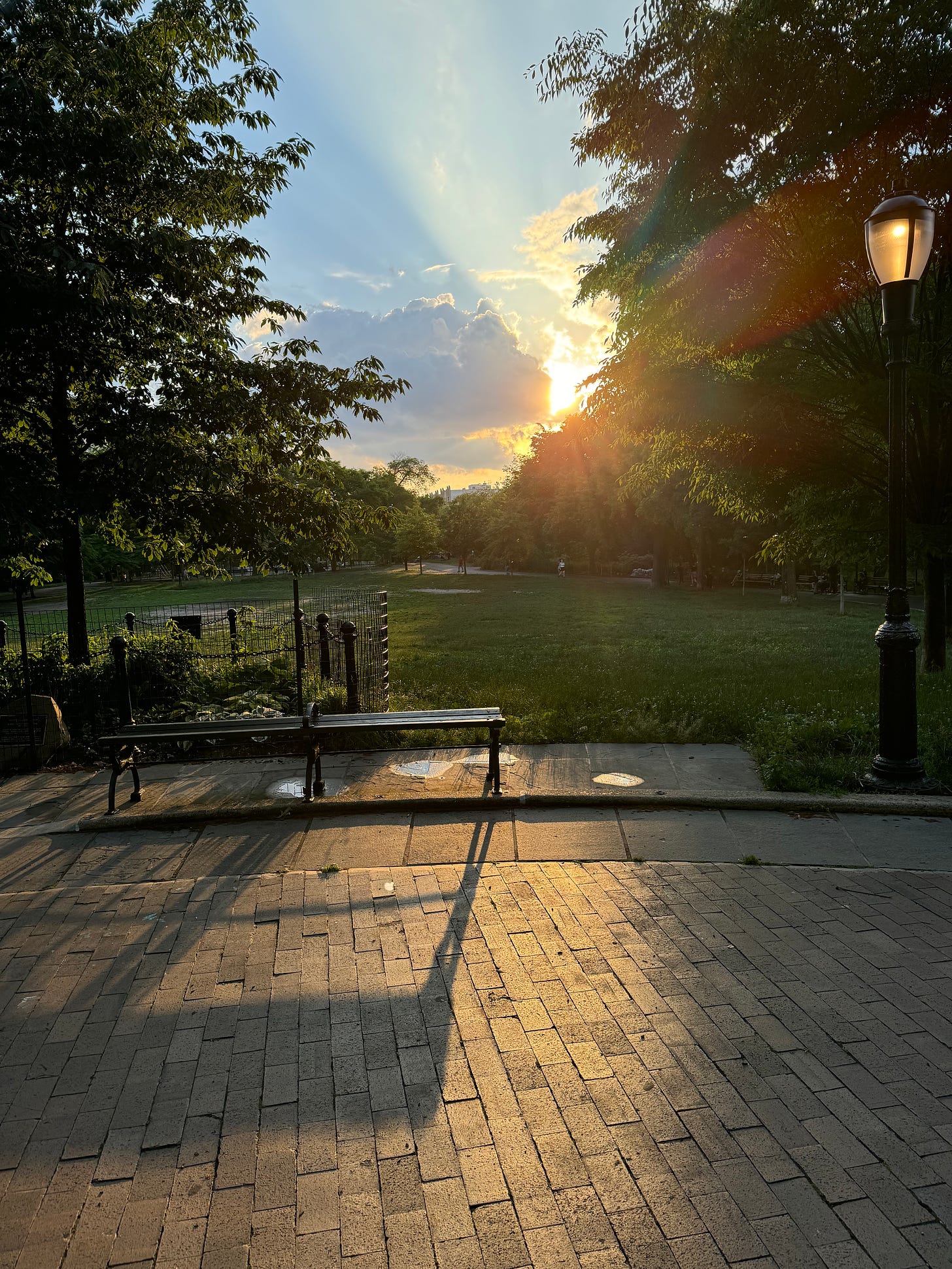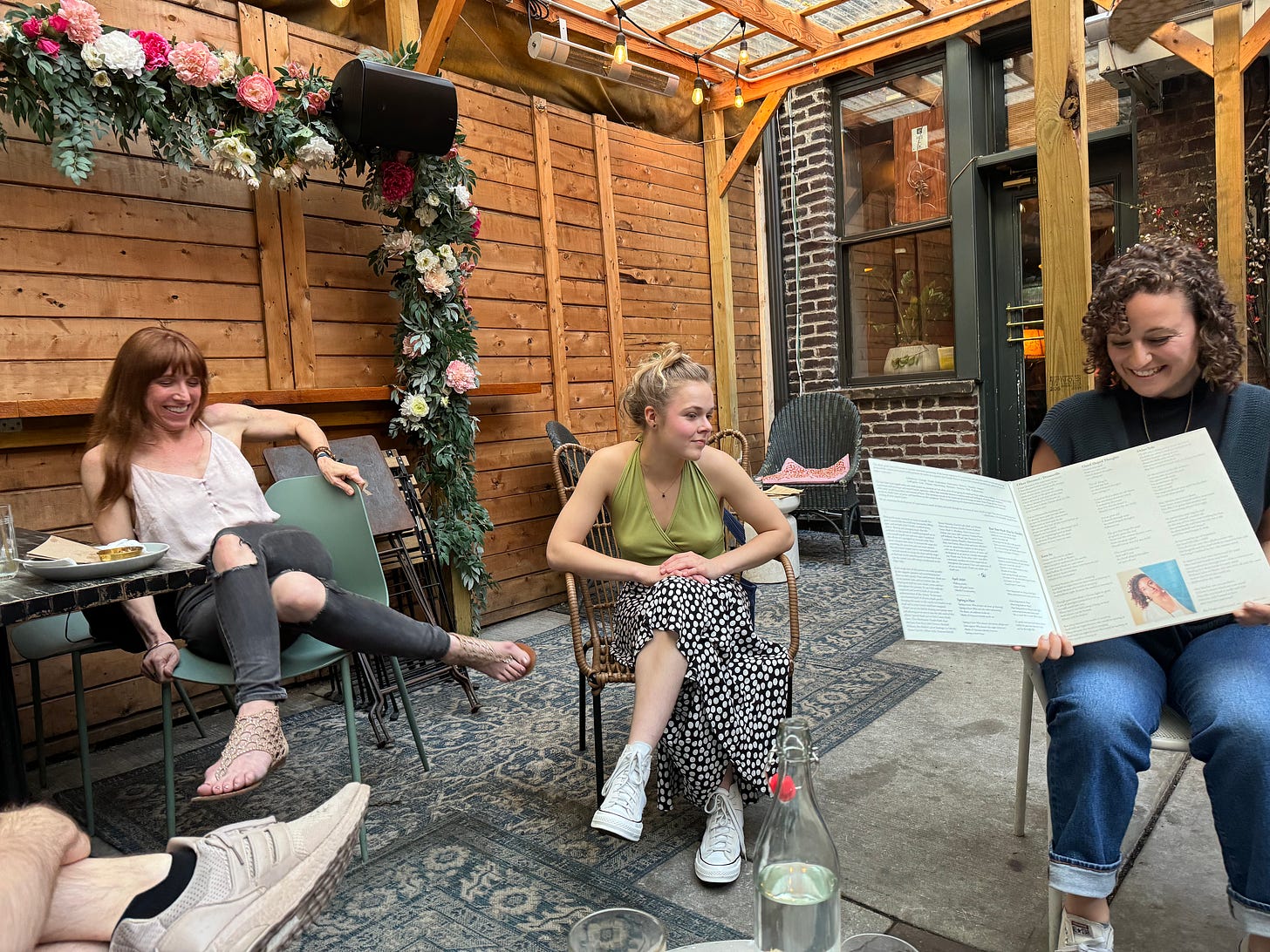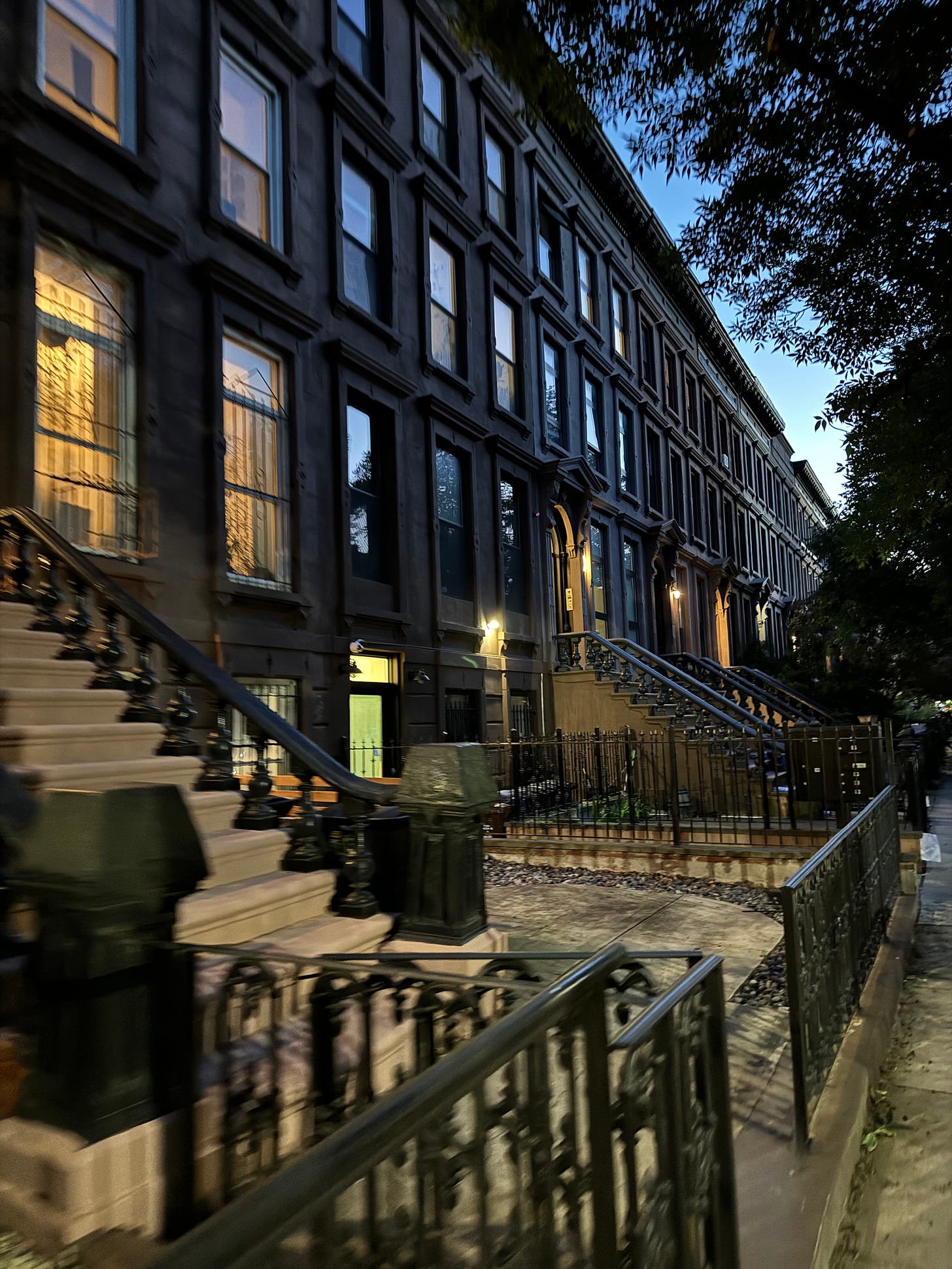I find myself wondering if I will ever want something so badly that I black out for it. To collapse – not with exhaustion from the proliferation of content I am bombarded with, from flailing from one pointless errand to the next – but from focusing too intensely, too completely, on a single thing. Modernity, with its endless advertisements, distractions, and notifications, does not easily lend itself to this pursuit.
Sometimes the best way out is through. But sometimes the best way out is out – as in, GTFO and run somewhere until you feel better. Until you remember that life is worth living, and that you want something in spite of the apparent meaningless of it all. Indeed, I wasn’t inclined to think of my lack-of-black-out as a potential character defect until I watched an interview of American Olympian Conner Mantz after his Boston Marathon run in 2023. I’ve time-stamped the link below, where he discusses his incredible experience from 1:57-3:00:
This cat was so committed to winning, and to pushing his body to its fullest capacities, that he literally blacked out in the middle of the race. His watch went blurry, the din of the spectating crowd dimmed, and he still proceeded at a six minute/mile pace. What I’m understanding from this is that Mantz’s “walking” pace – when on the brink of physical collapse, of bodily crisis – is a minute faster than my fastest possible mile time.
I’ve been thinking a lot about running lately, especially because I believe it may provide a good container through which to think about my musical practice. The Boston Marathon is one of the most prestigious races in the world. It distinguishes itself by requiring its participants to run a ridiculously fast qualifying time to even apply in the first place. The winner of this year’s race, Sisay Lemma, ran a 4:49/mile pace. I would encourage you to try to run even a single minute at this pace to understand how absurd this is. Then, afterwards, when you’re panting, sweating, delirious, and questioning the G** you believe in, think about how it might feel to sustain this pace for two hours.
While Sissay’s achievement is rather G**-like, I find myself just as interested in the results of the 961st place finisher in this year’s marathon, Eduardo Acevedo. I have no idea who the hell Eduardo Acevedo is. What I do know is that he finished the race in 2:47:08, or a 6:23/mile pace. This pace – at least to me – is also absolutely incredible. (ok, I’m now looking Eduardo up – he seems like a nice guy). At my current level of fitness, I can run about an ~8-8:15/min/mile pace comfortably. To reduce my time by two minutes would take an insane amount of focused effort over a very long period of time. The amount of training – years and years! – it took Acevedo to get to this point is absolutely laudable. He didn’t just go out for a casual jog here and there, rewarding himself with a litany of “little treats” from the boulangerie for doing so. The cat no doubt tanked it in session after session. His efforts place him in absolutely elite company. The delta between his time and that of runner 11,658 – which is about where I might finish – is profound. It would take many of us a lifetime of work to get to where he is. And yet he is nowhere near the leaderboard for this race. There is simply no way that he is making a living from running. And very few people – besides folks writing bizarre substacks on the relationship between music and running – have even heard of his name.
Music – and the arts more generally – is different from sports in so many ways. It is not hierarchical – there are no “places” or “order of finishers.” It centers aesthetics and taste, not the performance of a single discrete task. Opportunities are not dispersed meritocratically. Yet I do think we face a similar problem as runners: there are simply too many people out here doing great things for everyone to get the attention they deserve for the work they put in.
So what do we do? Give up and off ourselves because we didn’t get on that S****** playlist, weren’t awarded that grant, and think our efforts are destined to languish in relative obscurity? No! Certainly not in this season, with the light looking like this:
Instead, we share the light – spreading the work of our peers when and where we can. Just because someone is not getting in the “musical leaderboard” – with whatever the bizarre metric du jour is (streams, likes, plays, reviews, stars, hearts, blah, blah, blah) – does not mean they are not producing meaningful work.
I’ve recently started a series at Kissa Kissa in Crown Heights called “Dialogues.” We gather to listen to a local artist’s record from 6-7pm, and then have a group discussion about the music from 7-8 pm. We had our first one with Danielle Wertz the other week, and I found the experience to be quite moving. I couldn’t remember the last time I had listened to an album from front-to-back in the company of my peers. It’s a little bit like being in church, except for I’m 30, not 10, and I don’t want the service to end so I can go home and watch football. We have two more sessions scheduled for this month, with
on Monday, June 10 and Charlotte Greve on Tuesday, June 18. Please do come and listen with us.I find myself listening a lot these days – I’ve been going out more or less constantly to readings, galleries, and concerts over the past few weeks. It’s a joy to go out when it’s nice out, and these few weeks before the summer solstice are some of my favorite in the year. In his poem “East 4th St, Kensington, NY,” written for my Walking in the City suite, poet Dennis Nurkse writes about ambling down his block one summer evening and coming across a dog:
And here is the chained Doberman
who sleeps with his eye open
his muzzle in his paws
dreaming up a sea breeze
I love the syntactic flow of this stanza – its mellifluous, mimetic cadence. But I find myself most often returning to the double consciousness that Nurkse locates in the dog’s sleeping position. The admonition to “sleep with one eye open” generally has a negative connotation – directing one to remain vigilant, perceptive to their surroundings and any threats that might appear. The neighborhood Doberman, as nighttime watch guard, certainly plays that role here. But here, he’s more than mere protector. He’s also a dreamer: imagining a cool reprieve, an oceanic drift, a moment of pleasure in relief of his canine duties. It’s as if the good life he is imagining is so vital and vivid that he can’t even bring himself to close his eyes – he wants to visualize it right before him.
When I walk around the city around 7:30pm in these first few weeks of June, I find myself wanting to stay awake forever – or, in Nurkse’s formation, to sleep with my eyes open. I feel called to stay alert to all of the activity, and fearful of what I’ll miss if I shut them completely. There is so much happening on any given night. In the past week I’ve seen heroes like Brad Mehldau and Hanif Abdurraqib, as well as artists who no one outside my circle of peers knows. I’ve walked away from each show with new perspectives and reflections. Summer is a season for “living outwards,” I think – for doing and experiencing – and I want to keep running with these folks, this community, until I can’t anymore. Until I black out. And then, I’d like to fall asleep with my eyes open, alert to all of the great folks out there who I might be missing. Because I have no doubt that musician #961 in NYC – much like Eduardo in the Boston Marathon – is producing some seriously deep work.
Gigs & Gatherings:
Friday, June 7 with Anjoli Simone Guha & Paul Pandit at First Live
Sunday, June 9 with Matei Predescu and Paul Pandit at Scholes St. Studios (recording)
Monday, June 10 “Dialogues” series with Nora Stanley at Kissa Kissa. We’ll listen to her album “Distance of the Moon” at 6pm and then have a group discussion about it at 7pm
Tuesday, June 11 with Arnie Sainz at Anything
Wednesday, June 12 with Alana Cohen at Scholes St. Studios
Friday, June 14 Hosting a roof concert with Jan Esbra & Alejandra Sofia – message me for the address!
Saturday, June 15 with Perennials (Alex Koi, Tim Watson, Paul Pandit) at Berlin
Monday, June 17 with Stefani Bondari at So Gold
Tuesday, June 18 “Dialogues” series with Charlotte Greve at Kissa Kissa. We’ll listen to her album “Sediments We Move” at 6pm and then have a group discussion about it at 7pm
Wednesday, June 19 with Stefani Bondari at Crossroads
Sunday, June 23 - Thursday, June 27 with House of Legendary Opera at St. Ann’s and the Tank
Friday, June 28 Hosting a roof concert with Aaron Wolff, Tal Yahalom, Luke Rivard, Raina Arnett, and Rowyda Amin – message me for address!
Saturday, June 29 Reading at Syntax & Sound at Café Calaca
Sending energy,*
Chase
*courtesy Julia Catalano
(Dean St. at night)







Thoughtful and thought-provoking as always -- thanks for sharing, Chase. This hits me at a good time, as these days find me thinking often about how to work through a prolonged bout of feeling lonely artistically.
It's too long of a story for a comment -- the short version is that while I have musician friends and supporters here and elsewhere, a combination of age, experience, and style/genre leaves me feeling alone and apart. Typically, I respond to feelings like this by organizing gatherings as you're doing, but I've spent my whole life doing that and I want to spend more time writing and playing (especially as I'm the throes of transitioning from finishing a record to the business and design sides of a release). I don't have an answer yet -- your essay will stick with me as I continue to think through all of this.
Hope you're well!